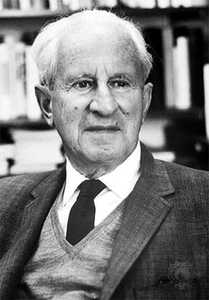Herbert Marcuse
|
|
Herbert Marcuse (July 19,1898 – July 29,1979) was a prominent German-American philosopher and sociologist of Jewish descent, member of the Frankfurt School.
Herbert Marcuse was born in Berlin, served in the German Army caring for horses in Berlin during the First World War. He then became a member of a Soldiers' Council that participated in the aborted socialist Spartacist uprising, which was ultimately crushed by the forces of the Weimar Republic. After completing his Ph.D. thesis at the University of Freiburg in 1922, he moved back to Berlin, where he worked as a bookseller. He returned to Freiburg in 1929 to write a habilitation with Martin Heidegger. In 1933, since he would not be allowed to complete that project under the Nazis, Marcuse joined the Frankfurt Institute for Social Research and emigrated from Germany that same year, going first to Switzerland, then the United States, where he became a naturalized citizen in 1940. During World War II he worked for the US Office of Strategic Services (forerunner of the CIA), analyzing intelligence reports about Germany (1942-45-51).
Although he never returned to Germany to live, he became one of the major theorists of the Frankfurt School, along with Max Horkheimer and Theodor Adorno.
In 1952 he began a teaching career as a political theorist, first at Columbia University and Harvard, then at Brandeis University from 1958 to 1965, where he was professor of philosophy and politics, and finally (already retirement-age), at the University of California, San Diego. He was a friend and collaborator of the historical sociologist Barrington Moore, Jr. and of the political philosopher Robert Paul Wolff. In the post-war period, he was the most explicitly political and left-wing member of the Frankfurt School, continuing to identify himself as a Marxist, a socialist, and a Hegelian.
Marcuse's critiques of capitalist society (especially his 1955 synthesis of Marx and Freud, Eros and Civilization, and his 1964 book One-Dimensional Man) resonated with the concerns of the leftist student movement in the 1960s. Because of his willingness to speak at student protests, Marcuse soon became known as "the father of the New Left" (a term he disliked and rejected). His work heavily influenced intellectual discourse on popular culture and scholarly popular culture studies. He had many speaking engagements in the US and Europe in the late 1960s and in the 1970s. He died on July 29, 1979, after having suffered a stroke during a visit to Germany. Second-generation Frankfurt School theorist Jürgen Habermas was with him during his final illness.
Many progressive scholars and activists were influenced by him, for example Angela Davis and Abbie Hoffman. (See the list in the final link, below.) A fellow German emigre, Paul Mattick, subjected One Dimensional Man to a Marxist critique. Marcuse's 1965 essay "Repressive Tolerance" became a favorite (albeit misunderstood) whipping boy of conservative critics.
He was NOT related to the émigré literary scholar Ludwig Marcuse (1894-1971) (see the German wiki); but may have been a distant relation of the Berlin sexologist Max Marcuse (1877-1963).
Major Works
- Reason and Revolution (1941)
- Eros and Civilization (1955)
- Soviet Marxism (1958)
- One-Dimensional Man (1964)
- Negations (1968)
- An Essay on Liberation (1969)
- Counter-Revolution and Revolt (1972)
- The Aesthetic Dimension (1978)
See also
External links
- Comprehensive 'Official' Herbert Marcuse Website (http://www.marcuse.org/herbert/index.html), by one of Marcuse's grandsons, with full bibliographies of primary and secondary works, and full texts of many important works
- Excellent narrative biography by A. Buick (http://www.worldsocialism.org/wsm-pages/marcuse.html), at worldsocialism.org
- Detailed intellectual biography and essays (http://www.gseis.ucla.edu/faculty/kellner/Illumina%20Folder/marc.htm), by Douglas Kellner, Marcuse scholar at UCLA
- "Herbert Marcuse (on-line) Archive" (http://www.marxists.org/reference/archive/marcuse/index.htm) at marxists.org
- Eros and Civilization (1955) (http://www.marxists.org/reference/archive/marcuse/works/eros-civilisation/index.htm) text excerpts online at marxists.org
- One-Dimensional Man (1964) (http://www.marcuse.org/herbert/pubs/onedim/odmcontents.html), complete text online at marcuse.org
- Repressive Tolerance (1965) (http://www.marcuse.org/herbert/pubs/65repressivetolerance.htm), complete text online at marcuse.org
- Complete bibliography of Marcuse's published works (http://www.marcuse.org/herbert/pubs/pubs.htm), at marcuse.org
- Long list of secondary works about Marcuse (http://www.marcuse.org/herbert/booksabout/booksabout.htm), at marcuse.org
- List of scholars and activists influenced by Marcuse (http://www.marcuse.org/herbert/people/scholaractivists/scholaractivists.htm), at marcuse.orgde:Herbert Marcuse
es:Herbert Marcuse et:Herbert Marcuse fr:Herbert Marcuse it:Herbert Marcuse he:הרברט מרקוזה no:Herbert Marcuse pl:Herbert Marcuse pt:Herbert Marcuse sv:Herbert Marcuse

